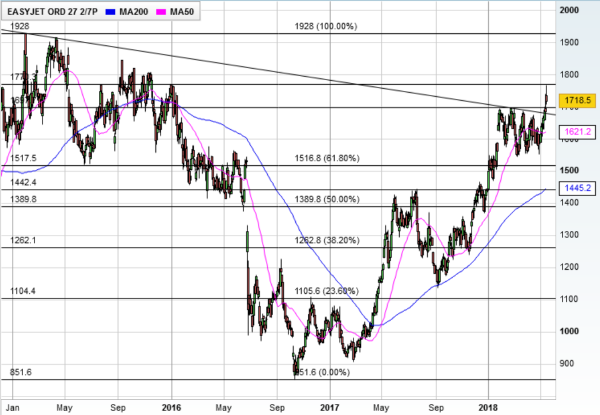easyJet shares boom continues
15th May 2018 12:26
by Graeme Evans from interactive investor
With the dividend disappointment of last summer now a distant memory, the fortunes of investors continued to brighten today.
Shares in the low-cost airline have now surged by 50% since last September, with analysts at RBC Capital pointing to a further 10% upside to 1,900p after CEO Johan Lundgren gave a boost to profits guidance with strong interim results.
He's also plotting further expansion by targeting more of the hotels and holidays market, as well as unveiling a series of initiatives to attract more business travellers and improve the loyalty of the easyJet customer base.
Lundgren said today: "All of these initiatives will provide higher profit per seat and higher returns for our shareholders."
That's an important message after easyJet's policy of paying its dividend based on a ratio of 50% of headline profit meant last year's dividend per share of 40.9 pence was down 13% on a year earlier.
This year, with easyJet now guiding to adjusted profits in the region of £530 million and £580 million, investors should see a return to dividend growth.

Source: interactive investor Past performance is not a guide to future performance
UBS thinks that the payout will rise to 47.9p in 2018 and 65.94p the following year, leading to a projected 2019 dividend yield of 4%. Prior to today, the broker had a 'buy' recommendation and price target of 1,800p.
Cantor Fitzgerald's transport analyst Robin Byde believes today's results have added at least £50 million to consensus profits estimates, but also wonders how much of this good news is now factored into the share price.
He said: "The stock is up over 30% in the past two quarters and is trading at a premium to its medium-term valuation. We expect the stock to go higher with this update, but this may not be sustained."
Byde reiterates his 'hold' recommendation with a target price of 1750p. He said the airline was trading on a consensus 2018 price/earnings (PE) multiple of about 16x versus its long-term average of 15x (a 7% premium).
There's no doubting, however, that Lundgren has kept the airline on the right path since replacing Carolyn McCall as boss in December.
A number of factors have helped, not least the collapses of Monarch, Air Berlin and Alitalia, as well as the impact of Ryanair's winter flight cancellations due to labour issues.
This combined to take capacity out of the market and enabled easyJet to increase passenger numbers by 9% to 36.8 million in the six months to March 31.
Revenues for the period topped £2 billion for the first time, with growth of 19.5% reflecting an 11% rise in revenue per seat to £54.10 and a strong increase in in-flight and ancillary sales. Forward bookings are also ahead of last year, at almost 80% for the current quarter and 57% for the second half.
Profits excluding the recent acquisition of Air Berlin operations at Tegel airport were £8 million in the half-year, which is a £220 million improvement on the loss reported for the traditionally weaker trading period in 2017.
Lundgren now sees a "significant opportunity" to transform the company's holidays offer. Currently 500,000 passengers book a hotel with the airline out of an addressable market of 20 million.
Capitalising on the strength of the easyJet brand, the airline will forge closer relationships with hotels operators based on its existing network of destinations.
The airline will also seek to attract more business passengers, having built this customer base from 10 million in 2012 to a record 13.7 million in the most recent half year. On some routes almost 60% of easyJet's customers are business passengers.
These articles are provided for information purposes only. Occasionally, an opinion about whether to buy or sell a specific investment may be provided by third parties. The content is not intended to be a personal recommendation to buy or sell any financial instrument or product, or to adopt any investment strategy as it is not provided based on an assessment of your investing knowledge and experience, your financial situation or your investment objectives. The value of your investments, and the income derived from them, may go down as well as up. You may not get back all the money that you invest. The investments referred to in this article may not be suitable for all investors, and if in doubt, an investor should seek advice from a qualified investment adviser.
Full performance can be found on the company or index summary page on the interactive investor website. Simply click on the company's or index name highlighted in the article.